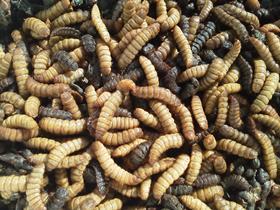
When it comes to environmental harm, global meat consumption has crept up the list of villains. While less scrutinised than plastics, greenhouse gases or pollution, expanding meat intake is now widely recognised as a major player in burdening our ecosystem.
It’s estimated that 60 per cent of global biodiversity loss is down to meat-based diets, with vast tracts of land often required to produce crop-based animal feed, used to rear cattle and poultry. In line with its mantra ‘partnership with nature’, Koppert is developing a novel answer to the problem by breeding insects for animal feed instead of crops.
“It’s a very hot topic,” says Jeroen Koppert, who is overseeing the project. “We are one of the main players in the field but it’s a very new industry and it takes time to develop.”
At the moment Koppert, through a branch group named Bestico, is trialling insect feed on salmon, a commodity with rapidly increasing global demand. “The way they are normally fed is small fish in the oceans are brought from the sea, they grind it up and then feed it to fish on land, it’s very inefficient.”
Early indicators for the project have proven successful. “We have done a lot of salmon-rearing trials which show the insect feed does not have any effect on taste or quality.”
Strictly speaking, Koppert actually harvests the larvae for the feed, rather than the insects themselves. It’s a process for which they were a natural fit, having cultivated a range of insects and mites since their founding in 1967. “Insect breeding is our specialty,” says Peter Maes, director of corporate affairs.
The process requires a Black Soldier Fly to lay an egg, which becomes larvae that feeds on waste from crop and food production. This creates a protein-rich larvae which can be processed into animal feed.
“Our goal is to get to a point where insect protein can partly substitute fish meal,” says Jeroen Koppert. “The vision is to process the food industry waste, the loose ends of the food production system, because there are big inefficiencies there.”
Despite what Koppert says is a “trendy” field, the usual barriers for the new product are still in play. Making inroads into a mature commodity industry, as well as with policy makers, is key to the growth into a profitable enterprise.
“Prices for things like soya are very low, particularly for fish feed. The commodity market for fish feed is huge. The capacity and the volumes of insects in the market is really small. Currently I don’t think any businesses in insect food production are profitable.
“At the moment the legislation doesn’t allow it to be used for omnivorous animals due to things like the BSE crisis. But in our opinion it’s not an issue and the EU is starting to change a lot of those laws.”
Should the winds of change start to pick up in the company’s favour, then Koppert is confident they have the beginnings of a strong and sustainable answer to the animal feed question.
“Of course our business uses buildings, space and heating as the insects require warmth to reproduce but we’re learning to make it more efficient as well. This is a journey for us too.”



